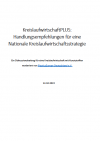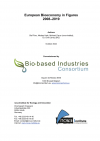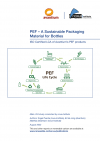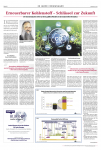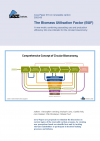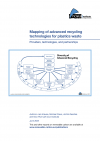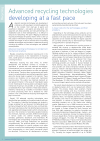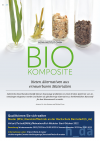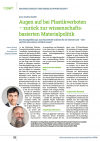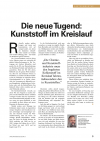Showing 101–120 of 431
-
Letter to the Commission on the definition of natural polymers in the REACH microplastics restriction
Policy, Sustainability & Health
4 Pages
490 Downloads
490 Downloads
2023-02
FREE
490
DownloadsSix leading associations and stakeholders from the chemicals, polymers and plastics sectors – namely BioChem Europe (a sector group of Cefic), EDANA, EuropaBio, European BioPlastics, GO!PHA and Renewable Carbon Initiative) – express in this letter their specific concerns about the proposed definition of “natural polymers” and its impact on biopolymers in the context of the REACH restriction on microplastics.
Under the coordination of the Renewable Carbon Initiative (RCI) they ask the European Commission in a letter “that in the adoption of the text of the Synthetic Polymer Microparticles restrictions (REACH Microplastics Restriction), the European Commission should not use the definition of ‘natural polymer’ which refers to a polymerisation process that takes place in nature.“
-
Bio-based Building Blocks and Polymers – Global Capacities, Production and Trends 2022-2027 (PDF)
Markets & Economy
387 Pages

2023-02
500 € – 1,000 €Price range: 500 € through 1,000 € ex. tax
Plus 19% MwSt.Press
release Select
licenceReport on the global bio-based polymer market 2022 – A deep and comprehensive insight into this dynamically growing market
The year 2022 was a promising year for bio-based polymers: Bio-based epoxy resin production is on the rise, PTT regained attractiveness after several years of constant capacities and PE and PP made from bio-based naphtha are being further established with growing volumes. Increased capacities for PLA are ongoing, after being sold out in 2019. Current and future expansions for bio-based polyamides as well as PHAs are on the horizon. And also, bio-based PET is getting back in the game.
DOI No.: https://doi.org/10.52548/CMZD8323
-
Bio-based Building Blocks and Polymers – Global Capacities, Production and Trends 2022-2027 – Short Version (PDF)
Markets & Economy
28 Pages
1966 Downloads
1966 Downloads
2023-02
FREE
1966
DownloadsReport on the global bio-based polymer market 2022 – A deep and comprehensive insight into this dynamically growing market
The year 2022 was a promising year for bio-based polymers: Bio-based epoxy resin production is on the rise, PTT regained attractiveness after several years of constant capacities and PE and PP made from bio-based naphtha are being further established with growing volumes. Increased capacities for PLA are ongoing, after being sold out in 2019. Current and future expansions for bio-based polyamides as well as PHAs are on the horizon. And also, bio-based PET is getting back in the game.
DOI No.: https://doi.org/10.52548/CMZD8323
-
Importance of mass balance and free attribution (MBFA) for the conversion of the chemical sector to alternative carbon sources (October 2022)
Policy, Sustainability & Health
4 Pages
769 Downloads
769 Downloads
2022-12
FREE
Free Shipping769
DownloadsA position paper of the Renewable Carbon Initiative
This position paper highlights the importance of mass balance and free attribution “MBFA” as one possible way to incentivise the transformation of the chemical sector away from fossil and on towards renewable carbon.
The term “mass balance” has become established to describe systems in which biomass, CO2 and secondary materials are used as a feedstock, but is not or not fully physically traced to the end product . It is common practice in many value chains in which large scale capacities are involved in one or more steps of the value chain that require mixing the sustainable with conventional material to fill the capacity. The approach makes it possible to substitute large quantities of fossil raw materials and attractive renewable content shares can be attributed to desired materials or products for which demand on the market exists. This incentivises a stepwise continuous transformation to increase the share of renewable carbon in particular for the large-scale chemical industry
However, the term “mass balance” is somewhat unfortunate because it is too general, and does not mention the essence of the method: the free attribution of the bio-based, CO2-based or chemically recycled share in the feedstock mix to certain selected end products.
The RCI recommends to only speak of “mass balance and free attribution (MBFA)” when talking about such cases, as this is how the complete method and its two central parts are referred to. This is transparent and honest, building trust from customers, end consumers and society in general. Both, mass balance and the free attribution are based on solid and established certifications.
Besides terminology, there is still a need for regulatory harmonisation between the schemes of the existing certification systems. MBFA cannot only be applied for bio-based feedstock, but also for CO/CO2 or feedstock from chemical recycling, both will gain strongly in importance in the coming years. Every MBFA scheme should cover these three renewable feedstocks: biomass, CO/CO2 and recycling.
-
Circular EconomyPLUS: Recommendations for action for a German Circular Economy Strategy
Policy
15 Pages
120 Downloads
120 Downloads
2022-11
FREE
Free Shipping120
DownloadsA contribution to the discussion on a circular economy for plastics moderated by PlasticsEurope Deutschland e. V.
With the necessary transformation into a circular economy with plastics, the plastics industry is facing a far-reaching paradigm shift. Plastics Europe would like to drive this change forward. In the first half of 2022, as part of an initiative by Plastics Europe Deutschland, leading experts in the field of circular economy with plastics have developed recommendations for action for the German circular economy strategy announced in the latest coalition agreement in 2021 after intensive consultations. Plastics Europe Deutschland took the role of a moderator in this discussion process in order to guarantee recommendations for action on a technical and scientific basis.
With this paper we would like to initiate a discussion process and actively accompany the circular economy strategy and thus also the transformation path for our industry.
-
Advanced Recycling Conference 2022 (Proceedings)
Markets & Economy, Policy, Sustainability & Health, Technology
131 Downloads
131 Downloads
2022-11
FREE
Plus 19% MwSt.131
DownloadsThe proceedings of the Advanced Recycling Conference 2022 (14-15 November 2022, hybrid, https://advanced-recycling.eu) contain conference presentations, the conference journal, sponsor documents and the press release.
-
RCI’s position paper: “Draft EU policy framework on bio-based, biodegradable and compostable plastics” (October 2022)
Policy, Sustainability & Health
5 Pages
538 Downloads
538 Downloads
2022-10
FREE
Free Shipping538
DownloadsThe Commission is currently preparing a “Policy framework on bio-based, biodegradable and compostable plastics.” The framework was announced in the Circular Economy Action Plan and is part of the Plastics Strategy for Circular Economy. It aims at developing guidance on the “sourcing, labelling and use of bio-based plastics, based on assessing where the use of bio-based feedstock results in genuine environmental benefits, going beyond reduction in using fossil resources” and on the “use of biodegradable or compostable plastics, based on an assessment of the applications where such use can be beneficial to the environment, and of the criteria for such applications”. While publication is planned for late 2022, the Renewable Carbon Initiative took the opportunity to comment on the draft from summer 2022.
-
nova-Session “Life Cycle Assessment (LCA) in Science and Policy” (Proceedings)
Sustainability & Health
2 Downloads
2 Downloads
2022-10
FREE
Plus 19% MwSt.2
DownloadsThe download of the proceedings contains all eight presentations.
This nova-Session (September 2022 and October 2022) discussed the important tool of Life Cycle Assessment (LCA) – its scientific and methodological principles as well as practical implementation in political decision-making.
Assessing and comparing products’ environmental performances is a critical element in transforming our economic system towards sustainability and mitigating climate change. How else to make decisions as to which technologies, feedstocks or production systems are preferable?
LCA according to ISO 14040 has become the most widely accepted and applied method to provide information on products’ and companies’ environmental performance.
As a standardised tool it offers many advantages such as credibility and comparability.However, it also offers flexibility to cover a multitude of products, companies and processes. This has the advantage that it can be adapted to all kinds of circumstances, but it also reduces comparability and there is a certain danger of greenwashing. Therefore, higher comparability has been a goal of LCA method development for quite some time. Recently, policy also has been referring more and more to LCA to provide guidelines, support, incentives or permits. These need fixed values and comparable results – so the longer intended method development is imperative now. Accordingly, there have been increased efforts to build on the LCA method for political purposes and develop common assumptions, comparators and default values for product groups. Prominent examples are the calculation rules for biofuels, the discussions about the Product Environmental Footprint (PEF), LCA calculations for bio-based plastics, GHG emissions of recycled plastics and for fuels made from CCU, discussions in the framework of the Taxonomy and more.
-
KreislaufwirtschaftPLUS: Handlungsempfehlungen für eine nationale Kreislaufwirtschaftsstrategie (PDF)
Policy
15 Pages
131 Downloads
131 Downloads
2022-10
FREE
Free Shipping131
DownloadsEin Diskussionsbeitrag für eine Kreislaufwirtschaft mit Kunststoffen moderiert von PlasticsEurope Deutschland e.V.
Mit der erforderlichen Transformation in eine Kreislaufwirtschaft mit Kunststoffen steht die Kunststoffbranche vor einem tiefgreifenden Paradigmenwechsel. Wir möchten diesen Wandel gerne vorantreiben. In der ersten Jahreshälfte 2022 haben im Rahmen einer Initiative von PlasticsEurope Deutschland e. V. ausgewiesene und führende Experten im Bereich der Kreislaufwirtschaft mit Kunststoffen in intensiven Beratungen Handlungsempfehlungen für die im Koalitionsvertrag angekündigte Nationale Kreislaufwirtschaftsstrategie erarbeitet. Plastics Europe Deutschland nahm in diesem Erörterungsprozess ausschließlich eine Moderatorenrolle ein, um Handlungsempfehlungen auf technisch-wissenschaftlicher Basis zu gewährleisten.
Mit diesem Papier möchten wir einen Diskussionsprozess anstoßen und die Kreislaufwirtschaftsstrategie und somit auch den Transformationspfad aktiv begleiten.
-
596 Downloads
2022-10
FREE
Free Shipping596
DownloadsThe new nova-Institute’s market report commissioned by the Bio-based Industries Consortium (BIC) shows macroeconomic effects of the European Bioeconomy in the period from 2008 to 2019. Using data from Eurostat and, where required, nova-Institute’s estimated bio-based shares, turnover and employment numbers of the bioeconomic sectors have been calculated. Even though the latest numbers no longer include the UK, the EU’s bioeconomy turnover remained stable, which has resulted in an increase of around 25% since 2008.
-
PEF – A Sustainable Packaging Material for Bottles (PDF)
Sustainability & Health, Technology
14 Pages
801 Downloads
801 Downloads
2022-08
FREE
Free Shipping801
DownloadsThe chemical technology company Avantium (NL) partnered with nova-Institut GmbH under the framework of the PEFerence project, to perform a full cradle-to-grave Life Cycle Assessment (LCA) for the YXY® Technology, assessing the potential environmental impacts of PEF packaging solutions in comparison to conventional PET packaging. The LCA is performed according to the ISO 14040/44 standard methodology. A critical peer review of the study, including experts of incumbent technologies, was conducted in order to verify whether the LCA met the requirements for methodology, data, interpretation, and reporting. This brochure summarizes the main aspects about the environmental sustainability of PEF-based bottles.
-
Erneuerbarer Kohlenstoff – Schlüssel zur Zukunft (PDF)
Policy, Sustainability & Health, Technology
2 Pages
346 Downloads
346 Downloads
2022-07
FREE
Free Shipping346
DownloadsDie chemische Industrie steht aktuell vor einer Vielzahl an Herausforderungen, aus denen eine neue, nachhaltige Chemie erwachsen kann – wenn die große Transformation in den nächsten Jahrzehnten gelingt. Und das muss sie!
Quelle: „Erneuerbarer Kohlenstoff – Schlüssel zur Zukunft“ – aus CHEManager 7/2022
https://www.chemanager-online.com/news/erneuerbarer-kohlenstoff-schluessel-zur-zukunft -
nova-paper #16: The Biomass Utilisation Factor (BUF)
Markets & Economy, Policy, Sustainability & Health
62 Pages
1475 Downloads
1475 Downloads
2022-06
FREE
1475
DownloadsThe Biomass Utilisation Factor (BUF) is a new metric combining cascading use and production efficiency into one indicator to investigate the circularity of materials for the circular bioeconomy. Cascading use captures the repeated use of the original biomass, either for the same or a different purpose. Production efficiency looks at how much of the biomass input is actually transformed into useful products or materials.
The BUF can serve not only as an indicator for the circular economy principle of keeping materials in use, but also act as an efficient tool for stakeholders and policy makers to identify options that maximize biomass utilisation and keep materials in use for longer. In light of recent political developments in Europe, the BUF can serve as a tool that provides additional insights for achieving sustainable carbon cycles or help to respect the cascading principle of biomass utilisation.
-
Mapping of advanced recycling – Providers, technologies, and partnerships – Short Version (PDF)
Technology
8 Pages
1418 Downloads
1418 Downloads
2022-06
FREE
Free Shipping1418
DownloadsAdvanced recycling technologies are developing at a fast pace, with new players constantly appearing on the market, from start-ups to giants and everything in between – new plants are being built, new capacities are being achieved, and new partnerships are established. Due to these developments, it is difficult to keep track of everything. The report “Mapping of advanced recycling technologies for plastics waste” aims to clear up this jungle of information providing a structured, in-depth overview and insight. It has an exclusive focus on profiling available technologies and providers of advanced recycling including the addition of new technologies and updated/revised profiles.
P.S.: All you want to know about advanced recycling technologies and renewable chemicals, building-blocks, monomers, and polymers based on recycling: Hear about it at the Advanced Recycling Conference (ARC), 28-29 November 2023, Cologne, Germany (hybrid event).
-
2022-06
2,500 € – 10,000 €Price range: 2,500 € through 10,000 € ex. tax
Plus 19% MwSt.Press
release Select
licenceAdvanced recycling technologies are developing at a fast pace, with new players constantly appearing on the market, from start-ups to giants and everything in between – new plants are being built, new capacities are being achieved, and new partnerships are established. Due to these developments, it is difficult to keep track of everything. The report “Mapping of advanced recycling technologies for plastics waste” aims to clear up this jungle of information providing a structured, in-depth overview and insight. It has an exclusive focus on profiling available technologies and providers of advanced recycling including the addition of new technologies and updated/revised profiles.
Further information:
The new report “Mapping of advanced recycling – Providers, technologies, and partnerships” differs from the old report “Chemical Recycling – Status, Trends and Challenges” as follows:
- All technology provider profiles from the old report included + updated to 2022.
- Overall >100 technologies and providers (vs. >70 technologies and providers in the old report)
- Extensive introductory part on polymer types, demand of different polymer types, waste fractions, political framework, position papers, technologies, LCAs, associations and waste management companies are no longer included in this report
In summary, this report is suitable for interested readers who have already dealt with the advanced recycling topic and are looking for an up-to-date overview of all identified providers and a detailed description of the technologies.
DOI No.: https://doi.org/10.52548/ITZE5668
P.S.: All you want to know about advanced recycling technologies and renewable chemicals, building-blocks, monomers, and polymers based on recycling: Hear about it at the Advanced Recycling Conference (ARC), 28-29 November 2023, Cologne, Germany (hybrid event).
-
558 Downloads
2022-06
FREE
558
DownloadsAdvanced recycling technologies are developing at a fast pace, with new players constantly appearing on the market, from start-ups to giants and everything in between – new plants are being built, new capacities are being achieved, and new partnerships are established. Due to these developments, it is difficult to keep track of everything. The report “Mapping of advanced recycling technologies for plastics waste” aims to clear up this jungle of information providing a structured, in-depth overview and insight. It has an exclusive focus on profiling available technologies and providers of advanced recycling including the addition of new technologies and updated/revised profiles.
-
Biocomposites offer alternatives from renewable materials (PDF)
Markets & Economy
6 Pages
687 Downloads
687 Downloads
2022-05
FREE
687
DownloadsNowadays, numerous biocomposites can easily be used in a wide range of applications and have reached the mass market as an equivalent alternative to conventional plastics. The second part of the document is in English.
-
Biokomposite bieten Alternativen aus erneuerbaren Materialien (PDF)
Markets & Economy
6 Pages
208 Downloads
208 Downloads
2022-05
FREE
208
DownloadsZahlreiche Bioverbundwerkstoffe können heutzutage problemlos in einem breiten Spektrum von Anwendungen eingesetzt werden und haben als gleichwertige Alternative zu herkömmlichen Kunststoffen den Massenmarkt erreicht.
-
Augen auf bei Plastikverboten – zurück zur wissenschaftsbasierten Materialpolitik (PDF)
Markets & Economy
2 Pages
98 Downloads
98 Downloads
2022-05
FREE
98
DownloadsZahlreiche Bioverbundwerkstoffe können heutzutage problemlos in einem breiten Spektrum von Anwendungen eingesetzt werden und haben als gleichwertige Alternative zu herkömmlichen Kunststoffen den Massenmarkt erreicht.
-
Die neue Tugend: Kunststoff im Kreislauf (PDF)
Markets & Economy, Policy, Sustainability & Health
1 Page
293 Downloads
293 Downloads
2022-05
FREE
293
DownloadsRohstoffe werden knapp, sowohl Metalle wie auch Mineralien. Nur erneuerbarer Kohlenstoff ist praktisch unbegrenzt verfügbar. Daher werden Kunststoffe in Zukunft noch wichtiger sein als heute, und deshalb müssen sie so nachhaltig wie möglich gestaltet werden: aus erneuerbarem Kohlenstoff und voll recycelbar.


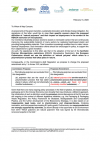
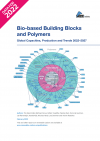
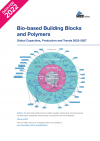
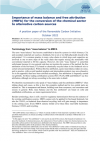
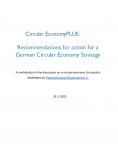

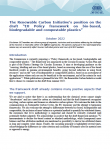
![nova-Session "Life Cycle Assessment (LCA) in Science and Policy" (Proceedings) [Digital]](https://renewable-carbon.eu/publications/wp-content/uploads/2020/05/21-01-07_RC-Publications-Cover-Proceedings_1-100x141.png)
